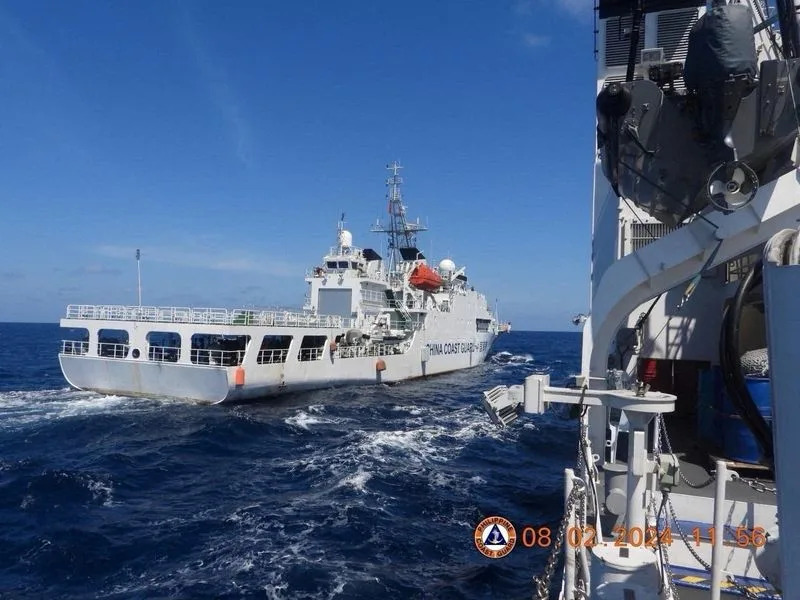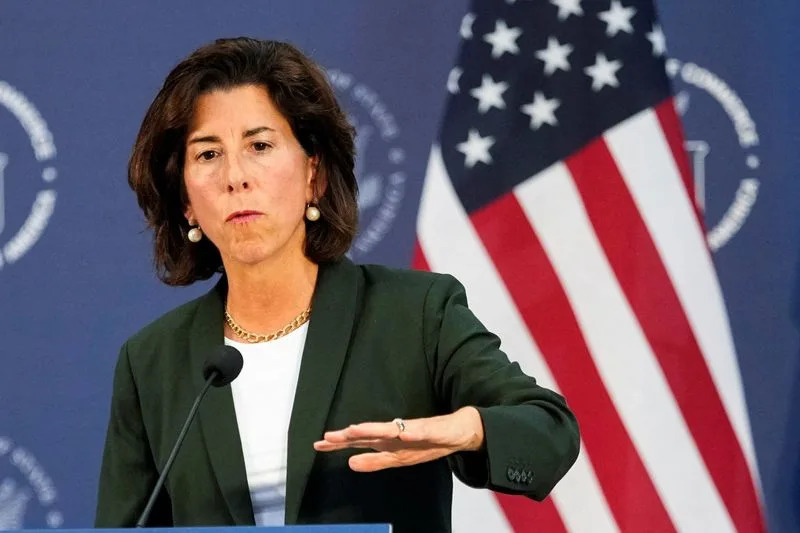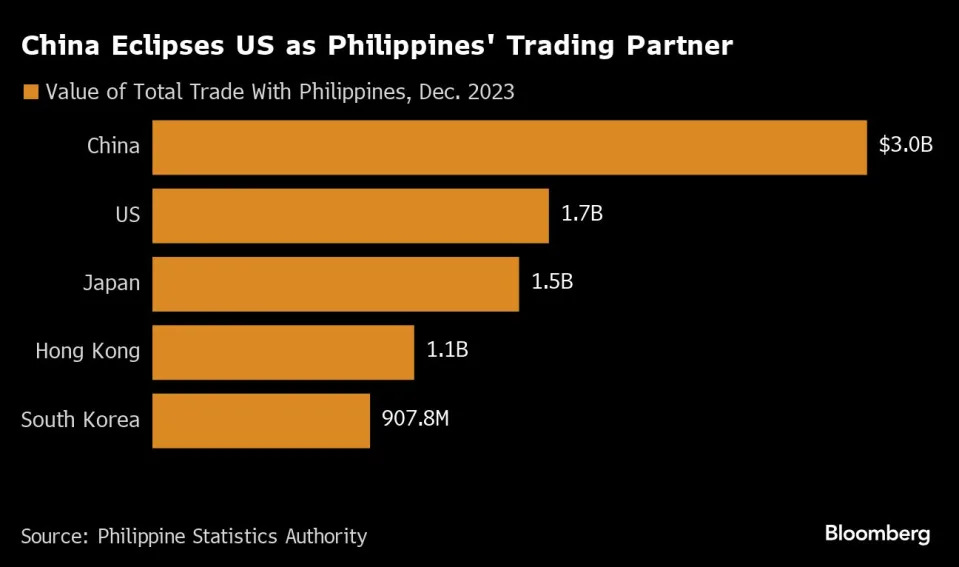Philippines' says China's maritime-related proposals run contrary to its interests

The Philippine foreign ministry said on Tuesday it had received several maritime-related proposals from China, but added they could not be considered because they were against the Southeast Asian country's national interests.
A China Coast Guard vessel manoeuvres near Philippine Coast Guard vessel BRP Teresa Magbanua near Scarborough Shoal in the South China Sea.
The foreign ministry said among the proposals from China was one where it "insisted on actions that would be deemed as acquiescence or recognition of China's control and administration over the (Second Thomas Shoal)" and that the Philippines could not consider such a proposal "without violating the constitution or international law".
The Department of Foreign Affairs (DFA) was responding to a Manila Times news article quoting an unnamed "ranking Chinese official" as saying that Beijing's proposals to normalise the situation in disputed areas in the South China Sea were "met with inaction" by the Philippine government.
"From the outset, DFA wishes to underscore that the Philippines is approaching these confidential negotiations with utmost sincerity and good faith," it said. "We were, therefore, surprised by China's disclosure of sensitive details of our bilateral discussions."
China presented 11 concept papers which proposed ways to manage the Second Thomas Shoal and fishing issues in Scarborough Shoal, the Manila Times reported, quoting the Chinese official.
The foreign ministry denied the Chinese official's claims, saying, "in no way did the Philippine Government ignore China's proposals."
US companies to announce investments of over $1 billion in the Philippines
American companies are set to announce investments amounting to more than $1 billion in the Philippines, U.S. Commerce Secretary Gina Raimondo said during an official visit to Manila on Monday.
Raimondo is heading a two-day trade and investment mission, the first of its kind for the Philippines. The delegation includes executives from 22 companies including United Airlines, Alphabet's Google, Visa, KKR Asia Pacific and Microsoft.
The investments will span areas like solar energy, electric vehicles and digitisation, she said.
United said last week it would launch new flights from Tokyo-Narita to Cebu, Philippines starting July 31.
U.S. efforts to deepen economic ties with the Philippines come in tandem with increased cooperation in defence. Both U.S. President Joe Biden and Philippine President Ferdinand Marcos Jr are keen to counter what they see as aggressive actions by China in the South China Sea and near Taiwan.
Speaking at a joint briefing with Philippine officials after meeting with Marcos at the presidential palace, Raimondo said Washington's commitment to expanding trade and investment in the Philippines extends to the larger Indo-Pacific region through the Indo-Pacific Economic Framework - a 14-nation U.S.-led group.
Raimondo reiterated the United States has no intention of "decoupling" from China but it would not be allowed access to Washington's advanced technology.
"My job is to protect the American people and to make sure that our most sophisticated technology, including semiconductor technology, artificial intelligence technology that we have and China doesn't have, that they can't access it and use it to enable the Chinese military," Raimondo said.
She also reaffirmed the United States' alliance with the Philippines, calling it "ironclad".
The Philippines has a 73-year-old mutual defence treaty with the U.S., making it Washington's oldest treaty ally in the Asia-Pacific region.
After her Manila visit, Raimondo will travel to Thailand for two days of meetings. She will lead members of the U.S. President's Export Council to identify opportunities for the two countries to strengthen cooperation in areas such as manufacturing and supply chain resiliency.
US Key to Philippine Plan to Tap Oil, Gas in South China Sea
The Philippines is counting on the US and its allies to play a crucial role in its plans to explore energy resources in the disputed South China Sea, according to Manila’s envoy to Washington.
The country is seeking to parlay its deepening security ties with Washington into broader economic benefits, said Philippine Ambassador to the US Jose Manuel Romualdez.
“When the time comes that we are going to start exploring it, we’ll have the options to be able to see how we can secure the expedition,” Romualdez said in an interview in Manila. “We’re working closely with our allies, not only the US but also Japan and Australia,” he said.
The Philippines is exploring several options in its quest to tap the resource-rich South China Sea, waters that China claims almost in its entirety. The body of water is estimated to hold significant quantities of oil and gas, according to the US Energy Information Administration.
Inviting US companies to invest in the exploration as well as development efforts and discussions with countries like Vietnam that also have overlapping claims with China are among the possible courses of action, he said on March 5.
The Philippines imports almost all its fuel needs and has been trying for years to start energy exploration in the disputed waters, including through a partnership with China. Negotiations between Manila and Beijing have, however, stalled amid heightened tensions, with their coast guard vessels recently clashing again at sea.
Any efforts toward developing resources in the South China Sea “should not harm China’s maritime rights and interests and sovereignty,” Chinese Foreign Ministry spokesman Wang Wenbin said in a regular media briefing on Monday. “We advocate negotiation and dialogue to properly settle maritime disputes, including on resource development,” Wang said.
Amid its spat with China, the Southeast Asian nation is enforcing a new strategy to defend its territory and economic interests. It has also recently inked several security deals with countries like the UK, Australia and Canada.
Calculated Way
Now the Philippines and its allies are “moving in a calculated way,” the envoy said declining to provide more details on the energy plan, except to say that it will likely happen within President Ferdinand Marcos Jr.’s term ending in 2028. “It’s part of our energy package,” he said, referring to a broad strategy to bring power costs — among the highest in the region — lower to attract investors.
As the Philippines builds its security alliances amid tensions with Beijing, it wants these partnerships to yield more trade and investment, said Romualdez. “While we have all these defense ties, the bottom line is economic prosperity. If we do not have economic security, we can have all these defense agreements and it would mean nothing to us,” the envoy, a cousin of Marcos, said.
China is also keen on reaping benefits from the resource-rich waters. President Xi Jinping has called on the military to align its maritime strategy with economic development, in what may further intensify its dispute with the Philippines.
In a wide-ranging interview ahead of the US trade and investment mission this week, Romualdez said Marcos is trying to leverage his rising influence on the global stage to win deals for the country. Over the past year, Marcos has deepened security ties with the US. The Philippine leader last month addressed the Australian parliament and in May will be the keynote speaker at regional security forum.
Marcos met with US Secretary of Commerce Gina Raimondo on Monday before he flew to Germany for meetings with Chancellor Olaf Scholz, alongside other Southeast Asian leaders. Raimondo is in Manila leading a delegation includes about 20 American executives to strengthen economic relations and spur investment into an increasingly important ally.
“President Marcos is very, very keen on trying to catch these investment opportunities open to us now because we’re in the center,” Romualdez said. Even European countries are taking interest, he added.
Raimondo said US companies that joined the trade and investment mission organized by President Joe Biden will invest more than $1 billion in the Philippines. From Manila, Raimondo will then proceed to Thailand, in hopes of boosting ties in areas including supply chain diversification.
While the Philippines’ strong relations with the US is an advantage, competition for investment among Southeast Asian nations is intense. Marcos has to prove that his government can provide a conducive business environment including less red tape and lower electricity costs, the envoy said.
High power costs remain one of the biggest hurdles for investors, according to Romualdez, and is one of the incentives driving the Philippines’ push to explore its own energy resources.
Marcos’s defense chief, earlier this year, said that it’s increasingly urgent for the Philippines to pursue resource exploration in contested waters, as a key gas field nears depletion.
Last month, the nation’s foreign affairs secretary signaled openness to energy talks with Beijing, while maintaining that Manila would not yield control of any venture to China.
For Philippine Ambassador Romualdez, the time for being soft with Beijing is over.
“What is ours is ours, and we’re not going to stop,” he said of the nation’s plans to explore resources in its exclusive economic zone. “We’ll do it when we feel like it’s time for us to do it,” he said.
- Questions and Answers
- Opinion
- Story/Motivational/Inspiring
- Technology
- Art
- Causes
- Crafts
- Dance
- Drinks
- Film/Movie
- Fitness
- Food
- Jogos
- Gardening
- Health
- Início
- Literature
- Music
- Networking
- Outro
- Party
- Religion
- Shopping
- Sports
- Theater
- Wellness
- News
- Culture
- War machines and policy




